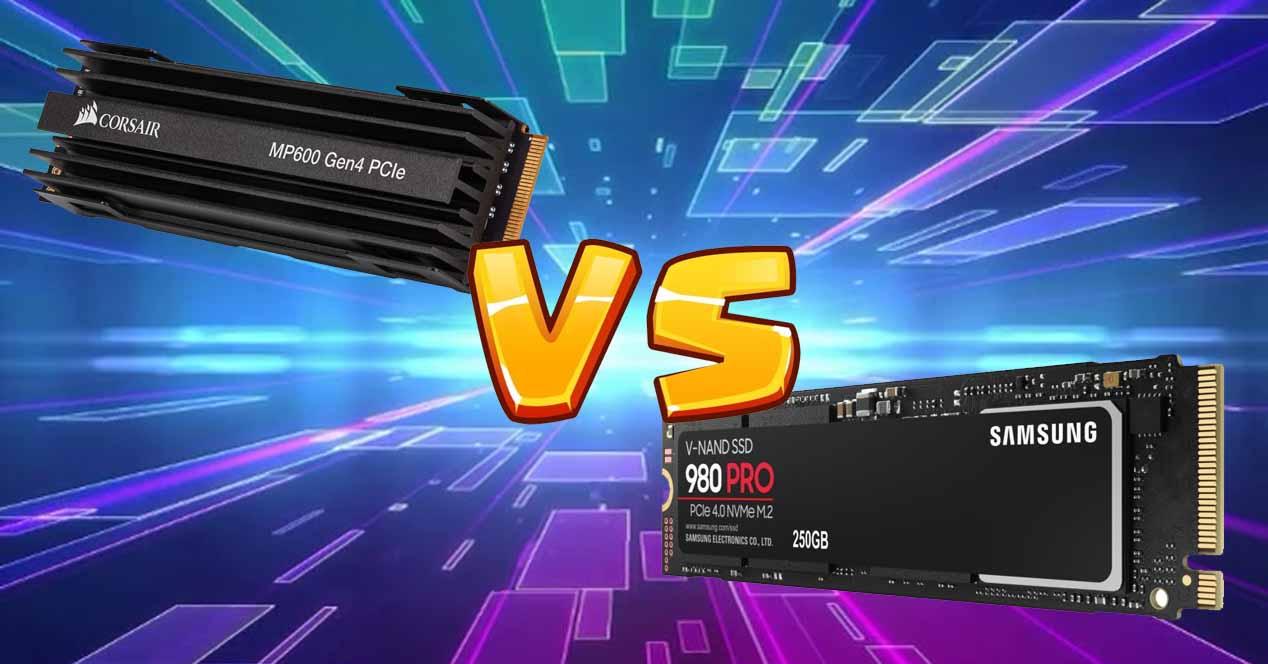As always, we will compare the prices first as the cost of the product will be a bottleneck for most users as we usually have a certain budget to choose PC parts and obviously not many people can spend it all. the money. the money that all the components cost. That said, here’s what a 1TB Corsair MP600 currently costs:
And that’s also the price of the 1TB Samsung 980 Pro:
A priori we see a price difference of about 80 dollars between one and the other SSD, but this price difference is it worth it? Let’s see.
Samsung 980 Pro vs Corsair MP600 technical comparison
| Corsair MP600 | Samsung 980 pro | |
|---|---|---|
| Form factor | M.2 2280 | M.2 2280 |
| Interface | PCIe 4.0 x4 NVMe 1.3 |
PCIe 4.0 x4 NVMe 1.3 |
| Capabilities | 500, 1000 and 2000 GB | 250, 500 and 1000 GB |
| Controller | Phiso PS5016-E16 | Samsung Elpis (custom) |
| NAND type | Toshiba 96L TLC | 3-bit MLC V-NAND |
| Support | CLEVER REDUCE NCQ DevSleep Garbage collection |
CLEVER REDUCE NCQ DevSleep Garbage collection |
| Encryption | 256-bit AES | 256-bit AES TCG / Opal V2.0 IEEE1667 |
| Sequential reading | 4.950 MB / s | 7,000 MB / s |
| Sequential writing | 4.250 MB / s | 5,000 MB / s |
| Shuffle playback | 600,000 IOPS | 1,000,000 IOPS |
| Random writing | 680,000 IOPS | 1,000,000 IOPS |
| Durability | 1,800 TBW | 600 TBW |
| Consumption | 0.003 W at idle 0.2 W on average 2.1W maximum reading 7 W max write |
0.003 W at idle 0.2 W on average 2.1W maximum reading 7 W max write |
| Operating temperature | 0 to 70 ºC | 0 to 70 ºC |
| Dimensions | 80 mm x 23 mm x 15 mm | 80mm x 22mm x 3.5mm |
| Weight | N / A | 10 grams |
| guarantee | 5 years | 5 years |
Both SSDs are M.2 2280 format, have a PCI-Express 4.0 x4 interface and use NVMe 1.3 protocol, but you may have already noticed in the pictures that there is a substantial difference physically speaking, and this is that the Corsair SSD comes with an aluminum heatsink painted black and the Samsung number. This should a priori make the Corsair MP600 run at a lower temperature than the Samsung 980 Pro, but it should also be noted that some SSDs in this format just don’t get too hot and don’t require a dedicated heatsink, so that doesn’t. must mean that Samsung’s SSD will have thermal throttling and Corsair will not.
Technically, the two SSDs are completely different: while Samsung’s 980 Pro uses a custom Elpis controller and uses V-NAND MLC chips, Corsair’s SSD uses a Phison PS5016-E16 controller and Toshiba memory chips. 96-layer TLC. This gives us very disparate data in terms of performance and durability, with the Samsung operating at theoretical maximum rates of 7000MB / s read and 5000MB / s write and the Corsair at 4950MB / s read and 4250 MB write / s, the Samsung being a clear winner in terms of performance.
As for durability, things are changing, and that is that the Corsair SSD has 1800 TBW for only 600 TBW of the Samsung. With a 5-year warranty on both, that means we could write almost 100GB per day every day for 50 years to deplete the durability of the Corsair MP600, while the durability of the Samsung 980 Pro is exactly a third of that – we could write a few 33gb a day every day for 50 years. Given that the average gaming PC writes 30GB per day to SSD memory, both SSDs will surely outlive us longer than any other hardware anyway.
In any case, in terms of durability, there is no doubt that the Corsair MP600 is the winner, with three times that of the Samsungt 980 Pro.
Which of the two SSDs is the most recommended?
As we saw in the technical comparison, the Samsung SSD has much higher performance, while the Corsair stands out for its durability. The price difference between the two is around 80 dollars, and really if you can afford it, we recommend going for the Samsung SSD because despite a third of the durability, the increase in performance is worth it. and it also continues. having a fairly high durability, since we are talking about an SSD in which you could write 30 GB per day every day for 50 years, which is no small feat.
Now the Corsair MP600 is still a great option for high performance storage if you can’t afford Samsung’s option.









